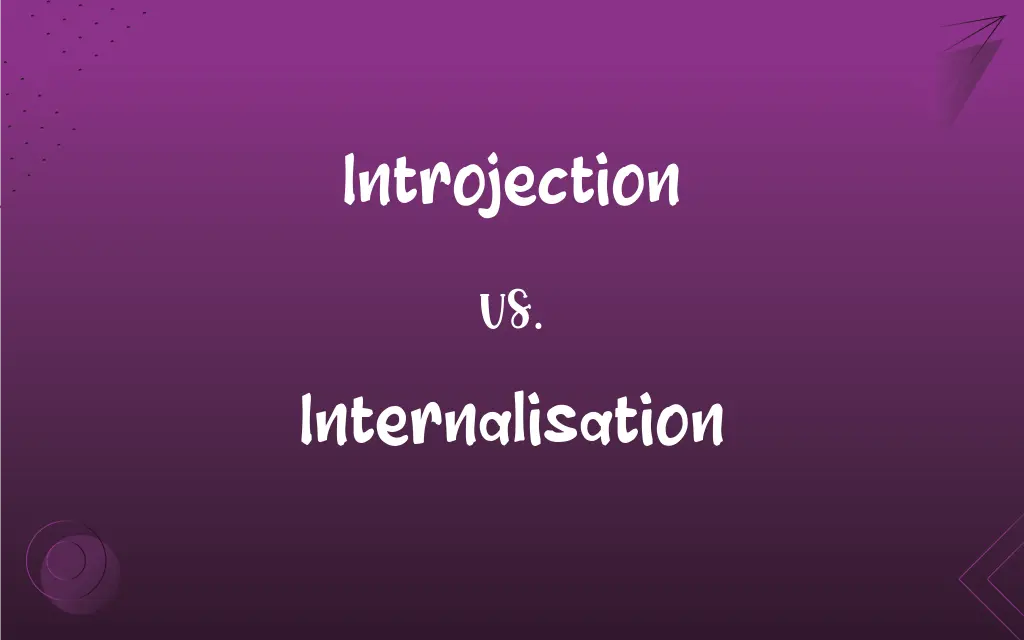Introjection vs. Internalisation: What's the Difference?
By Harlon Moss || Updated on May 22, 2024
Introjection involves adopting others' beliefs unconsciously, while internalization integrates these beliefs consciously, making them part of one's values.

Key Differences
Introjection refers to the unconscious adoption of others' beliefs, attitudes, or feelings. This process often occurs without critical evaluation or awareness, leading individuals to assimilate external viewpoints as their own. Internalization, on the other hand, involves a conscious and deliberate process where external beliefs and values are integrated into one's own belief system after careful consideration and acceptance.
Introjection typically happens in early childhood, where children absorb the attitudes and behaviors of their caregivers without question. This can lead to an internal conflict if the adopted beliefs are inconsistent with one's own emerging sense of self. In contrast, internalization usually occurs later when individuals critically assess and embrace beliefs that align with their values and understanding of the world, resulting in a more harmonious integration.
In therapeutic contexts, introjection can be seen as a defense mechanism where individuals uncritically accept the views of others to avoid conflict or maintain relationships. Internalization, however, is considered a more mature and stable psychological process that reflects personal growth and autonomy, allowing individuals to form a coherent and authentic identity.
The consequences of introjection can sometimes lead to internal conflicts and psychological distress if the introjected beliefs are at odds with one's genuine desires and needs. Conversely, internalization tends to foster a stronger sense of self and well-being, as the internalized values are congruent with one's true self and life goals.
Comparison Chart
Consciousness
Unconscious
Conscious
ADVERTISEMENT
Critical Evaluation
Lacking
Present
Typical Age of Occurrence
Early childhood
Later stages of development
Psychological Mechanism
Defense mechanism
Personal growth and autonomy
Resulting Integration
Potential internal conflict
Harmonious integration with self
Introjection and Internalisation Definitions
Introjection
Unconscious adoption of others' beliefs.
A child might introject their parent's fear of dogs.
ADVERTISEMENT
Internalisation
Incorporating external attitudes after evaluation.
He internalized his mentor's advice after reflecting on it.
Introjection
Assimilating external attitudes uncritically.
She introjected societal beauty standards without questioning them.
Internalisation
Harmonious integration with self.
She internalized the importance of self-care for her well-being.
Introjection
Unaware internalization of external norms.
The introjection of cultural norms shaped his behavior subconsciously.
Internalisation
Deliberate acceptance of norms.
Internalizing company policies made him a better employee.
Introjection
Defense mechanism to avoid conflict.
He introjected his boss's opinions to maintain harmony at work.
Internalisation
Conscious integration of external beliefs.
She internalized the values of honesty and integrity.
Introjection
Taking on others' emotions as one's own.
Introjecting his friend's anxiety made him feel stressed.
Internalisation
Personal growth through acceptance of beliefs.
He internalized the concept of lifelong learning.
Introjection
An unconscious defense mechanism in which one incorporates characteristics of another person or object into one's own psyche.
Internalisation
Alternative spelling of internalization
Introjection
(psychology) The process whereby the ideas of another are unconsciously incorporated into one's own psyche.
Internalisation
Learning (of values or attitudes etc.) that is incorporated within yourself
Introjection
(sychoanalysis) the internalization of the parent figures and their values; leads to the formation of the superego
Introjection
(psychology) unconscious internalization of aspects of the world (especially aspects of persons) within the self in such a way that the internalized representation takes over the psychological functions of the external objects
FAQs
How does internalization occur?
Internalization occurs through a conscious, deliberate process of reflection and acceptance.
How does introjection occur?
Introjection occurs unconsciously, often without critical evaluation.
At what age does internalization typically happen?
Internalization typically happens in later stages of development.
At what age is introjection most common?
Introjection is most common in early childhood.
What is internalization?
Internalization is the conscious integration of external beliefs and values into one's own belief system.
Does internalization involve critical thinking?
Yes, internalization involves evaluating and consciously accepting beliefs.
What is introjection?
Introjection is the unconscious adoption of others' beliefs and attitudes.
Does internalization promote psychological well-being?
Yes, internalization promotes psychological well-being by integrating beliefs that align with one's true self.
Does internalization contribute to a stable sense of self?
Yes, internalization contributes to a stable and consistent sense of self.
Is introjection a defense mechanism?
Yes, introjection can be a defense mechanism to avoid conflict.
How does internalization affect identity formation?
Internalization supports a coherent and authentic identity formation.
Can introjection lead to psychological conflict?
Yes, introjection can lead to internal conflicts if the adopted beliefs conflict with one's own.
Is internalization considered a mature psychological process?
Yes, internalization is considered a mature process reflecting personal growth.
What is the main difference between introjection and internalization?
The main difference is that introjection is unconscious and uncritical, while internalization is conscious and reflective.
How does introjection affect identity formation?
Introjection can complicate identity formation if the adopted beliefs clash with one's emerging sense of self.
Can introjection cause stress?
Yes, introjection can cause stress if the adopted beliefs are in conflict with one's own values.
Can introjection influence behavior subconsciously?
Yes, introjection can shape behavior without conscious awareness.
What role does reflection play in internalization?
Reflection is crucial in internalization, allowing for thoughtful acceptance of beliefs.
Can introjection be reversed?
Yes, through awareness and therapeutic interventions, introjected beliefs can be reassessed and modified.
Is internalization a sign of autonomy?
Yes, internalization reflects autonomy and personal agency.
About Author
Written by
Harlon MossHarlon is a seasoned quality moderator and accomplished content writer for Difference Wiki. An alumnus of the prestigious University of California, he earned his degree in Computer Science. Leveraging his academic background, Harlon brings a meticulous and informed perspective to his work, ensuring content accuracy and excellence.































































